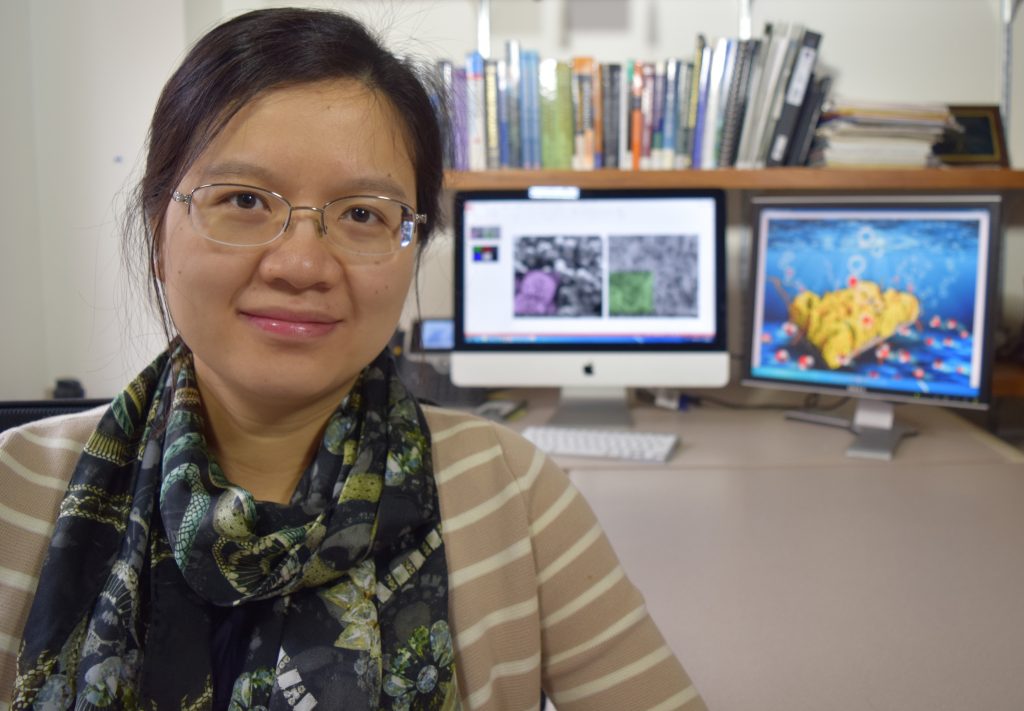
An ongoing research project by a mechanical engineering faculty member could lead to improved solar cells and better batteries for wind energy storage.
Shan Hu, an assistant professor of ME, recently received a CAREER award from the National Science Foundation (NSF). Hu is one of three ME researchers at Iowa State to receive the award this year, and is one of seven in the entire College of Engineering. The award will provide her with $500,000 over the next five years for her project entitled “Scalable Manufacturing of Hierarchical Nanostructures by Acoustically Modulated Emulsion Technique for Next Generation Renewable Energy Applications.”
“I will investigate how the acoustic field can move and assemble droplets of an emulsion, a multi-phase fluid system consisting of two or more immiscible liquids. And apply this knowledge to develop a new nanomanufacturing strategy for the scalable assembly of nano-sized building blocks into functional hierarchical structures,” said Hu. “The resulting hierarchical structures hold the promise of boosting the performance of solar cells, batteries, catalysts, and more.”
Hu, who joined the Iowa State faculty in 2014 after completing her PhD in mechanical engineering from the University of Minnesota-Twin Cities, said that winning this award has been a major accomplishment in her professional life.
“I am thrilled and grateful to receive this NSF CAREER award. Since I have been thinking and working on the proposed research idea behind the CAREER proposal for a long time, this award is a dream-come-true to me. This award is also very important for me to develop my career as a researcher and educator,” she said, adding that she’s thankful for efforts by her fellow faculty members as well as the pre-award support team.
Hu’s research will mostly focus on the mechanical engineering principles of acoustics and fluid mechanics. Specifically, she’ll look at the dynamics of emulsion droplets when they are subjected acoustic radiation forces and drag forces in a standing acoustic field. The findings of her research can have various applications, some of which relate directly to Iowa.
“The knowledge gained from this research project will enable the scalable manufacturing of designer materials, which hold the promise of boosting the performance batteries, which is an important component for wind energy storage, and catalysts, which enable faster and more efficient production of biofuels, both of which are major industries here in Iowa,” said Hu.
“I want to show that although mechanical engineering is one of the oldest branches of engineering, knowledge from a mechanical engineering degree is essential for solve emerging technical challenges in advanced materials and manufacturing, renewable energy, and more.”
Hu’s research will also aim to bring in students from underrepresented minority groups as well as students from community colleges to Iowa State to complete four-year degrees and potentially advanced degrees.
Hu plans to again serve as a mentor for the Microscale Sensing Actuation and Imaging (MoSAIC) Research Experience for Undergraduates (REU) program, which brings undergraduate students to Ames to participate in a summer-long research project. In the past the MoSAIC REU has brought in students who finish their associate’s degree at Des Moines Area Community College to complete a four-year degree from Iowa State. In addition to focusing on junior college students, Hu’s research will also attempt to recruit students from underrepresented minority groups.
“Engaging underrepresented minority groups is a good investment of time and effort,” said Hu. “My research group will benefit from increased diversity, because I believe a diversified group brings new perspectives and nurtures creativity to solve research problems.”
Hu is currently building the proposed nanomanufacturing platform with a team of both graduate and undergraduate students. In the next step, they will establish a multi-physics and multi-scale computational model of the setup to speed up the material design and manufacturing process.